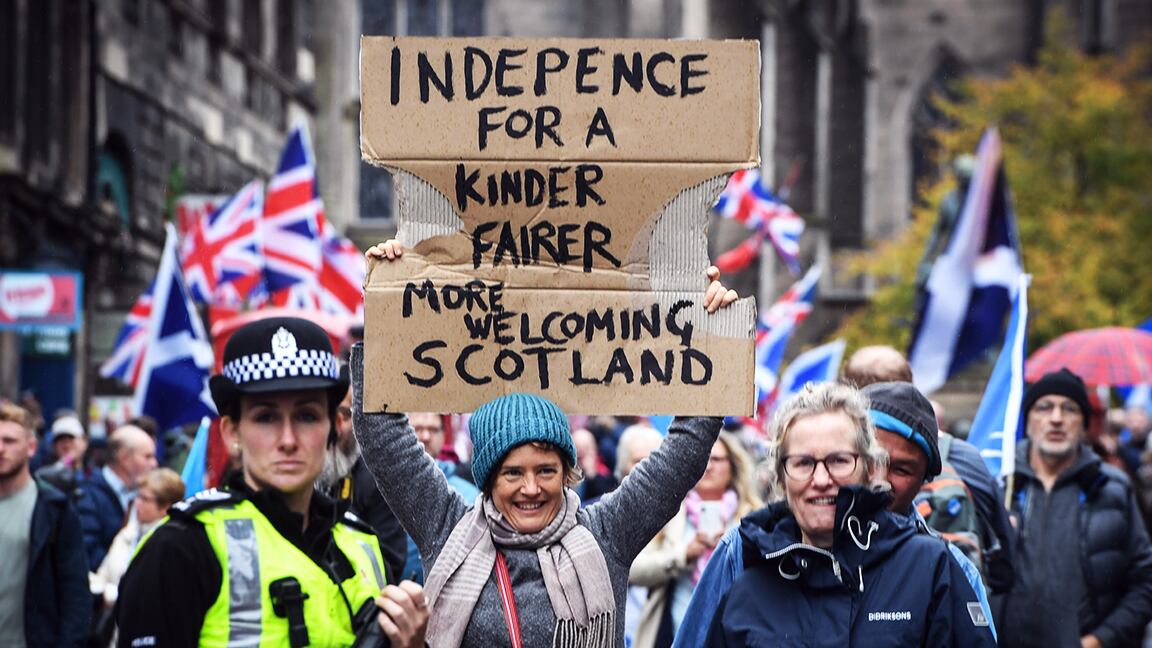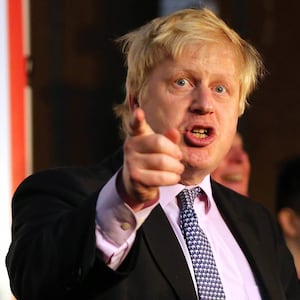LONDON—There are only two realistic outcomes from this week’s festive general election in the United Kingdom—and both of them could give the centuries-old union between England and Scotland a big old shove toward a collapse that looks ever more inevitable.
Take the first, and most likely, option: Boris Johnson walks to victory, forms a working government, and sees through his Brexit project by the end of January. It would be enough of a slap in the face for Scottish voters for Brexit to happen at all, given that its voters overwhelmingly rejected the idea in 2016’s referendum. But to have it done under the leadership of Johnson, who would be considered too far-fetched if created by a propagandist whipping up hatred toward the English ruling class, could be the union’s point of no return.
Then, secondly, say Jeremy Corbyn and his Labour party pull off a shock result and manage to cobble together a government of their own. Yes, a second EU referendum would come next, which could offer Scotland and the U.K. an escape raft from Brexit. However, Corbyn is likely to need the support of the pro-independence Scottish National Party in Parliament and he’s already conceded he may bow to their demands for a second Scottish independence referendum in the later years of his first administration. With polls showing that support for independence is gradually creeping upward, it’s very easy to imagine voters in Scotland tossing the U.K. onto history’s scrapheap some time in the next five years.
ADVERTISEMENT
Whatever way the British electorate turns Thursday, it seems impossible for them to make a choice that won’t potentially imperil the future of the United Kingdom. When voters put Christmas preparations on hold to go to the polls on Thursday, it’s quite possible this general election will be looked back on as the one that finally broke the union.
It didn’t have to be this way. When David Cameron granted Scotland the power to hold a referendum on independence in 2014, his gamble appeared to work when voters decisively endorsed staying inside the British union. In fact, so emboldened was he by his high-stakes tactic that he repeated it with the Europe question two years later—a decision that destroyed his political career and sent the country in a state of directionless panic unlikely to be fixed by the time his premiership is depicted in Season 15 of The Crown.
Having seemingly settled the Scottish issue for a generation in 2014, Cameron ripped it back open by failing to win the Brexit vote. Sixty-two percent of voters in Scotland backed staying inside the EU, but it wasn’t enough. That such a monumental decision could be taken against the wishes of Scottish voters gave independence backers the perfect, gift-wrapped example of why it can be harmful for a country to be bound to a much larger neighbor, especially when that partner is suffering from an absolutely enormous nervous breakdown.
Support for Scottish independence has risen this year as the Brexit project foundered in the British Parliament, first under the failed leadership of Theresa May then under Johnson, who somehow managed to bring his own fresh brand of chaos to proceedings. The most recent polls on the Scottish question have shown practically identical levels of support for leaving the United Kingdom and for staying inside it, but the momentum is with the independence side, which is benefiting as pro-EU voters re-evaluate where their priorities lie.
“If the SNP do well [this week], then expect them to redouble their efforts to push for another referendum within the next 12 months,” Scottish polling expert Mark Diffley told The Daily Beast. “The outcome of such a referendum would be highly uncertain given that support for independence has been on the rise in the last few months, with the most recent polls pointing to a 50/50 split.”
Diffley added: “This increase has come exclusively from those who voted to stay in the U.K. in 2014 but also voted for Britain to remain in the EU. This group of voters now say that they would rather be in an independent Scotland which is in the EU than in a U.K. which is outside of the EU. All of this makes the outcome of a referendum difficult to predict.”
It’s clear that more Scots are considering independence as an option to get away from Brexit, but the exact path of achieving that goal is less obvious. The simple route would be if Corbyn manages to form a minority government with the help of the SNP. The Labour leader would then be open to granting the Scottish government temporary powers to hold a legal referendum on Scottish independence, following the same precedent as in 2014. If support for independence hits more than 50 percent in that referendum, extremely difficult negotiations would then begin to find some way of unraveling centuries of intertwining history.
But Johnson has taken a much stricter approach and has ruled out ever granting Scotland the power to hold another referendum. Scottish independence leaders haven’t comprehensively answered how they would intend to bring about a referendum if the British prime minister outright refuses forever to give them one. Current SNP leader Nicola Sturgeon has repeatedly voiced her reluctance to follow the Catalonian example and hold an illegal vote.
Some in the SNP talk of an epic legal showdown in which the Acts of Union that forged the countries together in 1707 would be challenged in a U.K. Supreme Court battle between the Scottish and British governments. Sturgeon has previously said: “I think a referendum has to be legal and accepted because I’m not in the business of just having a referendum. I want Scotland to become independent so you have to have a process of doing that that is going to be recognized as legitimate… Beyond that, though, I will consider all options.”
Even if Scottish nationalists find it impossible to hold a legal referendum under Johnson’s rule, his time as prime minister will almost certainly help their case for when the day comes in the more distant future. Not only will Johnson force through Britain’s withdrawal from the EU, forging a permanent rift with the pro-EU voters in Scotland, he is despised already. “Polling evidence suggests Prime Minister Johnson is the least popular national politician in Scotland, with a satisfaction rating of -52 percentage points,” explained Diffley.
Alyn Smith, a member of the European Parliament for the SNP who is standing in the general election in the constituency of Stirling, told The Daily Beast that the prime minister is loathed by voters he meets—including some people who intend to vote Conservative—and said it’s difficult to imagine a more useful recruiting tool for Scottish independence than the prospect of five years being represented on the international stage by a shambling posho.
“The case is helped by him doing what he does,” said Smith. “This is somebody who, in no sense, will Scotland have voted for. He’ll be putting forward a range of policies that will be anathema to the people of Scotland, including Labour and Tory voters. We’re gaining middle Scotland after the gateway vote of the EU referendum. They’re increasingly seeing independence as the way out. If we see a Johnson government that looks and sounds more like the Brexit Party than the Conservatives, the extent to which that will be anathema to the people of Scotland will be something we’ll be able to exploit.”
If Johnson does win and does continue to block the prospect of a second independence referendum, SNP parliamentarians will carry out a harrying campaign. The idea is, essentially, to make the Scottish question such a constant irritation for Johnson while he deals with a million other problems while trying to push through Brexit that he changes his position. The proposed Supreme Court clash of governments could be a key component of that headache, and years of constant confrontation between Scotland and England will, inevitably, further loosen the already fraying ties that bind them.
“For Johnson, he is not a visceral unionist in the way that Theresa May was; he’s a calculating politician,” said Smith, in a characterization with which even Johnson’s closest friends would not disagree. “He could, in the same way he made a calculation that there’s votes in Brexit, decide there’s votes in being beastly to the Jocks as well. Remember, the people who are most in favor of Brexit aren’t big fans of ours.”
Some time early on Friday morning, it will become clear who will occupy 10 Downing Street. With Johnson, Scottish nationalists will rub their hands with glee at the prospect of having to do little else to persuade people to join their cause than point at the news every day. With Corbyn, they’ll know that it’s time to prepare for a do-or-die second referendum, most likely some time in the first half of the new decade. Either way, most believers in the union will despair.
This election has been billed by Johnson as all about getting Brexit done. Hopefully, when the public cast their votes Thursday, they bear in mind that their choices could also end up severing a second, much more ancient union.







